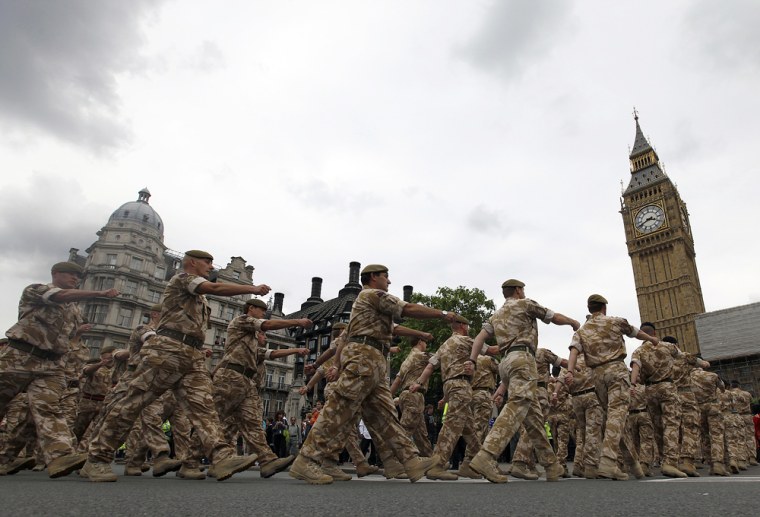European allies are bracing for their deepest cuts in military spending since the end of the Cold War, fueling concerns in Washington that an already wide gap in military power between the United States and the rest of NATO will grow.
On Monday, the German government said it is looking to reduce its 250,000-member military by at least 40,000 troops; the defense minister has suggested that a whopping cutback of 100,000 might be necessary.
Meanwhile, analysts project that Britain may have to cut its defense budget by 10 to 15 percent over the next six years as it grapples with what Prime Minister David Cameron has called "a staggering amount of debt."
France and Italy are also contemplating manpower reductions.
Defense Secretary Robert M. Gates, on a trip to London and Brussels this week, is pressing allies to hold the line as Pentagon officials fret they could be stuck with an even bigger share of the burden of the war in Afghanistan or future NATO missions.
On Tuesday, Gates said he was urging European leaders to avoid wholesale cuts to their active-duty forces and instead try to reduce overhead and other less essential programs.
"I think we all are having to take a hard look in a way that we haven't financially for the last couple years," he said after meeting with Britain's defense secretary, Liam Fox.
Europe's fiscal troubles have worsened considerably since February, when Gates warned that NATO was confronting a "crisis" because U.S. allies had spent too little on defense over the past decade and were too averse to using military force.
Other NATO leaders, who are expected to gather in Brussels for meetings Thursday and Friday, warned that the long-term consequences could be dire if European lawmakers, in search of a quick budget fix, squeeze their militaries too much.
"We have to take care not to cut too much or in the wrong way, that we might jeopardize our security in the future," NATO Secretary General Anders Fogh Rasmussen said Monday in Brussels. "After all, economic prosperity depends on security, too."
For many European governments trying to recover from the global financial crisis, their armed forces are prime candidates for the chopping block.
In the United States, however, the Obama administration has declared defense and national security programs off-limits to the budget ax.
Gates has warned U.S. military officials to prepare to tighten their belts, as well, after nine years of soaring defense budgets. But the Pentagon is expected to confront only a slowdown in spending, to slightly above the annual rate of inflation.
'A train wreck in the economy'
In contrast, some NATO allies confront actual cuts that could substantially diminish their military power.
"We know that we've got financial constraints," Fox said Tuesday in a joint news conference with Gates. "We've inherited a train wreck in the economy."
Gen. David Richards, the chief of the British army, acknowledged Tuesday that some major military programs are in trouble.
"The most important long-term strategic factor in our security is economic prosperity," he said at a security conference. "If that is so, must we in defense accept that not all our cherished programs will survive?"
Malcolm Chalmers, an analyst at the Royal United Services Institute, a think tank aligned with the Defense Ministry, said "optimistic" projections suggested that Britain could be forced to cut its active-duty forces by 20 percent over the next decade. The British military could see its total number of aircraft reduced by a quarter, and the navy could have its fleet cut by a similar amount.
"The size of the total reduction is likely to be quite considerable," he said. "The fiscal pressures in Europe, not least in the U.K., are pretty inexorable."
